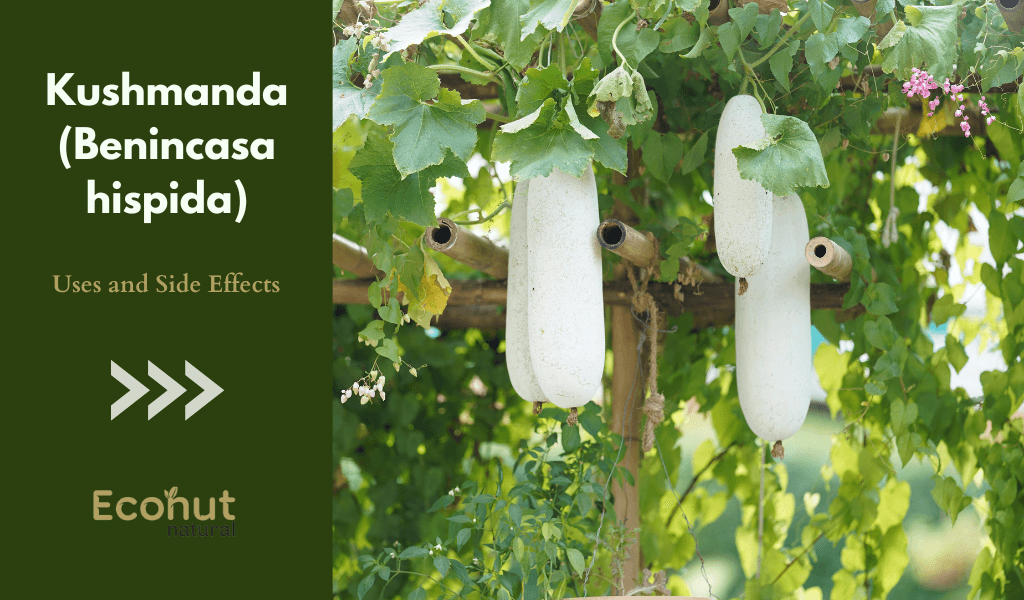Kushmanda, Winter Melon (Benincasa hispida) is a type of gourd that belongs to the Cucurbitaceae family. It’s widely cultivated in Asia, particularly in India, China, and Southeast Asia. This gourd is known for its large size, with some varieties reaching up to several kilograms in weight.
In Hindu mythology, Kushmanda is also the name of one of the forms of Goddess Durga, and this vegetable is believed to be her favorite. In Ayurveda, the medicinal properties of Kushmanda are highly valued. It’s considered cooling and beneficial for the body, particularly during hot seasons. Its juice is often used for its diuretic and detoxifying properties.
In culinary terms, Winter Melon is versatile. It’s used in soups, curries, stir-fries, and even desserts in some Asian cuisines. The flesh of the gourd is mild in flavor and absorbs the flavors of other ingredients well, making it a popular choice in many dishes. Additionally, the seeds of the Winter Melon are sometimes roasted and eaten as a snack.
Overall, Kushmanda or Winter Melon is not only a staple in Asian cuisine but also holds cultural and mythological significance in various traditions.
Kushmanda, also known as Winter Melon or Benincasa hispida, is a vine plant that produces a large, oblong-shaped fruit.
Discription
Kushmanda, also known as Winter Melon or Benincasa hispida, is a vine plant that produces a large, oblong-shaped fruit.
Appearance:
The fruit typically has a pale green to white coloration with a waxy coating on its surface.
It can grow to quite a large size, often reaching up to a foot or more in length and weighing several pounds. The outer skin is smooth and firm, with faint ridges running lengthwise along the fruit.
Texture:
The flesh of the Winter Melon is crisp and somewhat watery, similar in texture to a cucumber or a watermelon. When cooked, the flesh softens and takes on the flavors of the ingredients it’s cooked with.
Taste:
The taste of Winter Melon is mild and somewhat neutral, which makes it versatile for use in both savory and sweet dishes. It tends to absorb the flavors of the foods it’s cooked with, making it an excellent addition to soups, stews, curries, and desserts.
Nutritional Value:
Winter Melon is low in calories and rich in dietary fiber, making it a great choice for those looking to maintain a healthy diet. It also contains vitamins and minerals such as vitamin C, vitamin B, potassium, and calcium.
Classification of Kushmanda, Winter Melon (Benincasa Hispida)
| Kingdom | Plantae |
| Subkingdom | Tracheobionta |
| Order | Violales |
| Family | Cucurbitaceae |
| Superdivision | Spermatophyta |
| Division | Magnoliophyta |
| Class | Magnoliopsida |
| Subclass | Dilleniidae |
Names of Kushmanda, Winter Melon (Benincasa Hispida)
Mizoram: Maipawl
Sanskri: Brhatphala, Kushmanda
Tamil: Alattuppucini, Ven Poosani
Latin name: Benincasa hispida
Sanskrit name: Kushmanda, Pushpaphala
Assamese: Komara, Kumora
Bengali: Kumra, Chal Kumra
Hindu: Gol-Kaddu, Raksa
Malayalam: Cumbulam, Kumpalam
Marathi: Kohala
Tulu: Karkumbuda
Telugu: Budidegummadi, Pendligummadikaaya
Urdu: Petha
French: Courge Cireuse
German: Wintermelone
Chinese: Pai Gua
Italian: Zucca Della Cera
Japanese: Togan, Togwa
Malay: Kundur
Nepalese: Petha
Pakistan: Petha
Singapore: Tang Kua
Sri Lanka: Puhul
Benefits of Kushmanda, Winter Melon (Benincasa Hispida)
Kushmanda, also known as Winter Melon or Benincasa hispida. We discuss some of benefits regarding Winter Melon (Benincasa Hispida).
Nutrient-Rich:
Kushmanda is packed with essential nutrients including vitamins A, C, and B-complex vitamins like folates, thiamine, niacin, and riboflavin. It also contains minerals like calcium, potassium, magnesium, and phosphorus.
Hydration:
With its high water content, Winter Melon helps keep the body hydrated, which is crucial for various bodily functions including digestion, circulation, and temperature regulation.
Digestive Health Issue:
The fiber content in Kushmanda aids digestion by promoting regular bowel movements and preventing constipation. It also supports a healthy gut microbiome.
For Weight Management:
Despite being low in calories, Winter Melon provides a feeling of fullness due to its high water and fiber content, which can help in weight management by reducing overall calorie intake.
Antioxidant Properties:
Kushmanda contains antioxidants like vitamin C and flavonoids which help neutralize harmful free radicals in the body, potentially reducing the risk of chronic diseases and promoting overall health.
Immune Support:
The vitamin C content in Winter Melon is beneficial for immune health, as it helps boost the production of white blood cells and strengthens the body’s defense against infections and illnesses.
Heart Health:
Potassium, found in abundance in Kushmanda, is essential for maintaining healthy blood pressure levels, which in turn supports heart health and reduces the risk of cardiovascular diseases.
Skin and Hair Health:
The vitamins A and C present in Winter Melon are beneficial for maintaining healthy skin and hair. Vitamin A promotes skin cell turnover, while vitamin C aids in collagen production, contributing to youthful skin and strong hair.
Diuretic Properties:
Kushmanda exhibits diuretic properties, promoting urine production and helping in the elimination of toxins from the body, which may benefit kidney health.
Anti-inflammatory Effects:
Some studies suggest that Winter Melon may possess anti-inflammatory properties, potentially helping to alleviate inflammation-related conditions such as arthritis.
Also Read: Patala (Stereospermum suaveolens): Uses, Health Benefits and Side Effects
Properties of Kushmanda, Winter Melon (Benincasa Hispida)
Hindi / Sanskrit
- Rasa, Madhura
- Guna, Laghu, Snigdh
- Virya, Sheeta
- Vipaka, Madhura
English
- Taste, Sweet
- Physical Property, Light, Unctuous
- Potency, Cold
- Metabolic Property (After Digestion), Sweet
Kushmanda, Winter Melon (Benincasa Hispida) Side Effects
Kushmanda, also known as Winter Melon or Benincasa hispida, is a fruit commonly consumed in various Asian cuisines and is also used in traditional medicine due to its potential health benefits. While it’s generally considered safe for consumption when consumed in moderate amounts. We are discuss some of side effects regarding Kushmanda.
Allergic Reactions:
Some individuals may be allergic to winter melon. Allergic reactions can range from mild symptoms like itching and skin rashes to more severe reactions like difficulty breathing or anaphylaxis. If you have a known allergy to cucurbit fruits like cucumber or pumpkin, you may also be allergic to winter melon.
Gastrointestinal Issues:
Consuming large amounts of winter melon may lead to gastrointestinal discomfort in some people. This can include symptoms like bloating, gas, diarrhea, or stomach cramps. These effects are more likely if you eat a large quantity of the fruit at once.
Hypoglycemia:
Winter melon has a low glycemic index, which means it doesn’t cause a rapid spike in blood sugar levels. While this can be beneficial for individuals with diabetes or those trying to manage their blood sugar levels, it may lead to hypoglycemia (low blood sugar) if consumed excessively, especially when combined with medications for diabetes.
Interactions with Medications:
If you’re taking medications for diabetes or blood sugar control, consuming winter melon may interact with these medications, leading to fluctuations in blood sugar levels. It’s important to monitor your blood sugar levels closely and consult with your healthcare provider if you have concerns about interactions.
Pregnancy and Breastfeeding:
There’s limited information available regarding the safety of consuming winter melon during pregnancy and breastfeeding. While it’s generally considered safe when consumed in moderation as part of a balanced diet, pregnant and breastfeeding women should exercise caution and consult with their healthcare provider before adding it to their diet.
People suffering from obesity should consume winter melon in minimal doses.
It is also not ideal to consume it if someone is suffering from asthma, cold or bronchitis as it is known to increase kapha.
Conclusion
Winter melon, also known as Kushmanda or Benincasa hispida, offers potential health benefits but should be consumed in moderation. Allergic reactions, gastrointestinal discomfort, and interactions with medications, especially for diabetes, are possible side effects. Pregnant and breastfeeding women should consult healthcare providers before adding it to their diet. Monitoring for any adverse effects is important for safe consumption.
FAQS
Can Winter Melon help in managing diabetes?
Winter Melon has a low glycemic index, which means it does not cause a rapid increase in blood sugar levels. The fiber content in Winter Melon slows down the absorption of glucose, which may help in managing blood sugar levels. However, individuals with diabetes should still monitor their portion sizes and overall carbohydrate intake.
Is Winter Melon beneficial for heart health?
The potassium content in Winter Melon helps in regulating blood pressure and maintaining heart health. Its low sodium content makes it suitable for individuals with hypertension or those looking to manage their blood pressure levels.
How can Winter Melon be used to improve skin health?
The vitamin C content in Winter Melon can help in collagen production, which is essential for maintaining skin elasticity and reducing wrinkles. Applying Winter Melon juice or pulp topically may help in hydrating the skin and reducing inflammation, providing a natural glow. Some people use Winter Melon juice as a toner to cleanse and refresh the skin.

